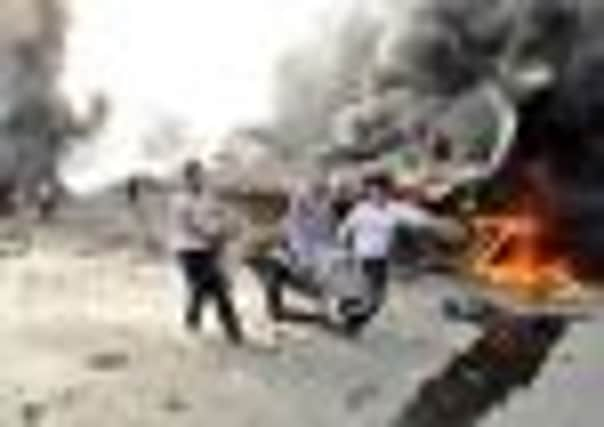Al-Qaeda fear over Syrian carnage as suicide bombs rock Damascus


The blasts further shredded a ceasefire declared by United Nations’ special envoy Kofi Annan on 12 April but which has failed to halt bloodshed pitting Mr Assad’s security forces against peaceful demonstrators and an array of armed insurgents.
Mr Annan condemned the “abhorrent” bombings and urged all parties to halt the violence. “The Syrian people have suffered too much,” he said.
Advertisement
Hide AdAdvertisement
Hide AdThe near-simultaneous explosions hit the al-Qazaz district just before 8am local time, residents said. One punched a crater 10ft deep in the city’s southern ring road, shredding passers-by. The façade of the nearby Palestine Branch Military Intelligence centre, one of the most feared of more than 20 Syrian secret police agencies, was said to have been damaged. The walled complex was targeted in a 2008 bombing that killed 17 people. It was blamed by the authorities on Islamists.
In addition to the 55 dead, the interior ministry said there were 15 bags of human remains, meaning the toll was likely to rise. It said the explosives used weighed more than 1,000 kilos.
The opposition Syrian Observatory for Human Rights put the death toll at 59 and said most victims worked for the security forces. No group has claimed responsibility.
The interior ministry vowed to “chase down the criminal killers and those who help or house them in their dens”. It also appealed to citizens to pass on any information that might help. The attacks came a day after a bomb exploded near UN observers monitoring the ceasefire and two weeks after authorities said a suicide bomber killed at least nine people in the capital.
Yesterday’s blast was similar to attacks carried out by al-Qaeda in Iraq, which would bolster recent allegations by US intelligence officials that the terror network was the likely culprit behind previous bombings in Syria. That raises the possibility that its fighters are infiltrating across the border to take advantage of the political turmoil.
A shadowy group called the Al-Nusra Front has claimed responsibility for some of the attacks in web posts. Little is known about the group, though western intelligence officials say it could be an al-Qaeda front.
Opposition to Mr Assad, which began with peaceful protests in March 2011, has grown increasingly militarised. UN Secretary-General Ban Ki-moon said on Wednesday there was only a narrow window of opportunity to avert full-scale civil war.
Syrian state TV showed a man pointing to the wreckage. “Is this freedom? This is the work of the Saudis,” he said. Saudi Arabia has advocated arming rebels.
Advertisement
Hide AdAdvertisement
Hide AdNadine Haddad, a candidate in Monday’s parliamentary election which was boycotted by most opposition figures, blamed Qatari premier Sheikh Hamad bin Jassim al-Thani, who also backs arming insurgents.
“I am addressing Sheikh Hamad and I tell him shame on you. You are now destroying the Syrian people, not the Syrian regime. You are killing children going to school,” she said.
Qatar condemned the blasts, as did Russia. Its foreign minister Sergei Lavrov said: “Some of our foreign partners are doing practical things so that the situation in Syria explodes in literal and figurative sense.”